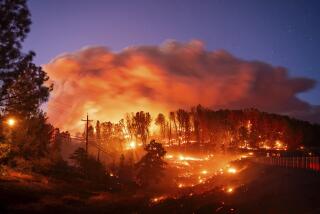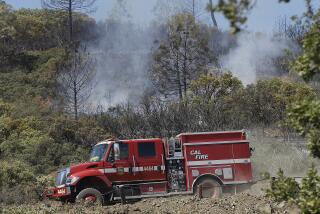Texas reviewing old arson convictions for suspect evidence
HOUSTON -- An outside review of Texas arson convictions has uncovered suspect cases that are expected to be presented to a panel of state fire experts in January.
Advocacy groups say the review could help overturn wrongful convictions.
Those leading the inquiry at the Lubbock-based Innocence Project of Texas are reviewing cases in which investigators relied on “junk science,” since-discredited approaches to analyzing crime-scene evidence and to determining whether fires were intentionally set. They plan to bring their findings to a panel of fire experts assembled by Texas Fire Marshal Chris Connealy.
The review was spurred by a report last year by the Texas Forensic Science Commission, which acknowledged that unreliable science helped lead to Cameron Todd Willingham’s conviction for murder by arson in 1992. Willingham, 24, had been charged in connection with the deaths of his three young children in a 1991 fire at their home in Corsicana, about 55 miles south of Dallas. He was executed in 2004.
Five years later, the commission was preparing to discuss a report from an expert who said that fire investigators who handled the case had a poor understanding of the science involved and that the cause of the fire appeared to be undetermined. But Republican Gov. Rick Perry, who said he was confident in Willingham’s guilt, replaced the head of the commission, who canceled the meeting and placed the Willingham case review on hold.
Last year’s science commission report did not draw any conclusions about Willingham’s guilt, but it recommended better training for fire investigators and the review of arson convictions that is underway. In particular, the report recommended examining convictions that predated the 1990s, when advances in forensic science led to the rejection of certain approaches to arson investigation.
Such evidence, including pour patterns, “spalling,” or discoloration, and broken or “crazed” glass — once considered proof a fire had been intentionally set — has since been called into question, according to the commission’s report. Connealy said he is using the report as a “blueprint” for improving fire investigations.
“We will fundamentally change how we do fire investigations not only here in Texas, but leading the way for the United States,” Connealy told The Times.
Innocence Project staff members began their review by searching for arson convictions and then seeking information from more than 1,000 inmates. They received about 250 replies and whittled that down to about 30 cases they wanted to investigate in detail, according to Nick Vilbas, executive director of the Innocence Project of Texas.
They have been pulling trial transcripts for the cases to see what evidence was presented at trial, and they plan to bring questionable cases to the six-member state fire panel when it meets Jan. 7 in Houston, Vilbas told The Times.
“It’s still too early to say how many cases will have bad science involved,” Vilbas said. “There’s a handful that look like they have potential.”
One case included weak evidence about how a house fire started, he said. Another involved questionable arson evidence from a fire in the 1980s in Pasadena, about 15 miles east of Houston. That inmate is serving a 75-year sentence, Vilbas said, declining to identify the individual pending completion of the review.
Vilbas said the arson inquiry is the first of its kind in the country.
“It could be an example for the rest of the country to follow because Texas isn’t the only place where out-of-date arson techniques have been used,” he said.
Vilbas said his group has received help from the state fire marshal, who has been on the job four months and whom he called “extremely forthcoming and proactive” in assembling cases for review.
Connealy, a former fire chief who has been in the field since 1978, said he supported the inquiry to address errors that may have led to wrongful convictions. His office is also reviewing old arson cases, he said, and hopes to work with investigators on active cases someday.
In the meantime, he said, the expert panel -- which costs $150,000 annually and includes the leader of the forensic science commission -- would also lead quarterly training sessions for fire investigators.
“Most fire investigations are so science-centric,” he said. “Just as you’ve seen with DNA, there could have been advances that have come about that we need to review.”
ALSO:
Astronauts bond with each other, their spacesuits
Girl mistaken for skunk at Halloween party shot by relative
Douglas Kennedy, RFK son, on trial in child endangerment case
More to Read
Sign up for Essential California
The most important California stories and recommendations in your inbox every morning.
You may occasionally receive promotional content from the Los Angeles Times.











